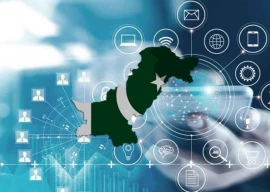
Internet penetration in Pakistan is 14%, whereas it is 30% in India, 49% in China, 31.9% in Bangladesh, 67% in Malaysia and 40% in Asia. During 2014-15, as compared with India’s $99.6 billion worth of IT exports, Pakistan’s IT exports amounted to only $0.82 billion.
Unfavourable taxation and huge import duties are hindering the performance of this sector and it places Pakistan amongst one of those five countries that have the highest taxation. A recent study based on the sample of 122 countries placed Pakistan at the third largest tax imposing country on mobile phones.
Pakistan’s IT sector more robust than before
In the budget of 2015-16, tax on mobile phones was doubled. This tax is in addition to the SIM activation tax.
IT agreement
The Strategic Trade Policy Framework 2015-18 indicates that for the sake of greater market access, Pakistan will enter into the Information Technology Agreement (ITA) of the WTO, which requires complete elimination of tariffs on import of IT related products.
Although the Ministry of Information Technology and Ministry of Commerce have in principle agreed to ratify this agreement, the Federal Bureau of Revenue (FBR) is still lobbying for high taxation.
The FBR fears that elimination of custom duties will result in a revenue loss of around Rs4.5 billion. However, demand for IT products is highly price elastic. Decline in custom duties will enhance the domestic tax base by increasing the usage of IT.
The assessment of Deloitte (UK) reveals that if Pakistan eliminates custom duties on IT products, the loss in customs revenue can be covered through gains in tax revenue in the course of two years.
By reducing the sales tax on SIM cards, the government has already seen some of the benefits of reforming IT-specific taxes. Sales tax on SIM card was reduced from Rs2,000 to Rs1,000 in 2004 and further reduced to Rs250 in 2009. As a result of this reduction, there was a phenomenal increase in mobile phone penetration and also in government revenue. In these five years the cumulative revenue from this sector amounted to $8 billion.
The other argument against the ratification of ITA is that foreign competition will curb the establishment of IT related industries in Pakistan. It should be realised that Pakistan is not the manufacturer of any IT product. Nevertheless, some of the IT related products are assembled in Pakistan by using imported components.
Telecom Policy 2015: Collection of platitudes
Custom duties on these components is increasing the cost of assembled products, making investment in this sector unattractive. According to an industry expert, nearly 40% of the IT related companies have shifted to the UAE. The companies are hiring Indians or Sri Lankans. Hence, custom duties and taxation are not just hindering the growth of this sector but also shifting capital towards other countries. The ITA will incentivise low-tech indigenous industry to become part of a global supply chain.
Learning from example
After signing the ITA, China, Thailand, Malaysia and the Philippines joined the global supply chains and their exports revenues grew several folds. Pakistan Computer Association (PCA) endorsed the signing of ITA on the grounds that it will reduce the costs and facilitate the growth of the IT industry in Pakistan. Pakistan Software Houses Association (P@SHA) also supports the accession of ITA, while recommending that the government should also abolish locally imposed taxes on IT.
The impact of joining ITA on the Philippines’ economy is an excellent example for countries like Pakistan which are deliberating acceding to this agreement. After becoming signatory of ITA, the Philippines attracted several MNCs. Today, eight out of the 30 world’s top chip makers and the electronic companies like Hitachi, Toshiba and Fujitsu are operating there and in the first six months of 2015, their electronics exports amounted to $13 billion.
It is high time to build an internal consensus on ITA. The short term concerns should be ignored to welcome long term opportunities. It is highly recommended that Pakistan should sign this agreement in the greater interest of its own people and economy.
The writer is a Research Analyst at Policy Research Institute of Market Economy (PRIME)
Published in The Express Tribune, May 16th, 2016.
Like Business on Facebook, follow @TribuneBiz on Twitter to stay informed and join in the conversation.





1734951821-0/Copy-of-Untitled-(88)1734951821-0-270x192.webp)

1734899716-0/image-(15)1734899716-0-270x192.webp)








1734778885-0/Untitled-(10)1734778885-0-270x192.webp)






COMMENTS (7)
Comments are moderated and generally will be posted if they are on-topic and not abusive.
For more information, please see our Comments FAQ